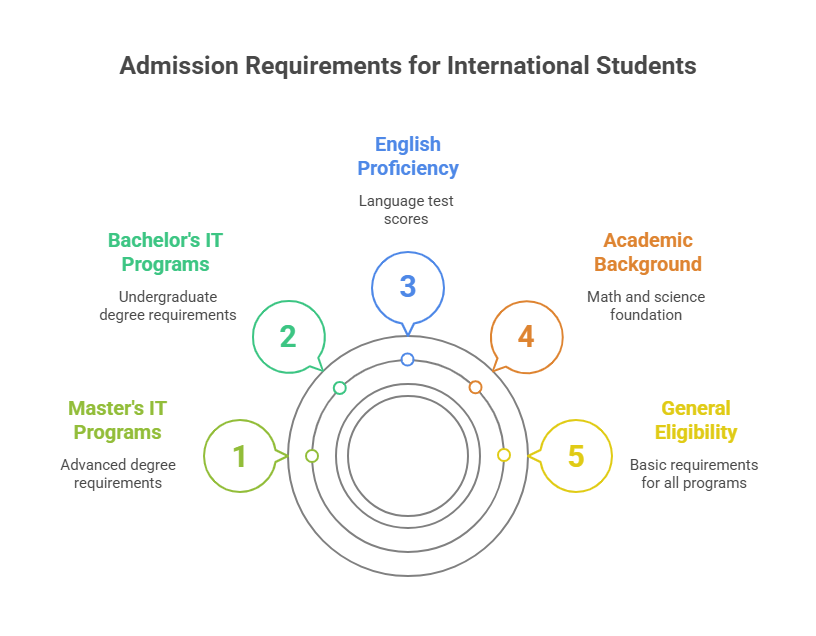Canada has emerged as a top destination for international students pursuing world-class IT education for international students who would like to pursue world-class education in IT. In 2023, over 30% of Canada’s 642,000 international students enrolled in IT programs – a testament to its world-class tech education system. With the tech-oriented economy, a broad range of academic programs, and an open immigration policy, Canada is an ideal take-off point for IT enthusiasts.
If you plan to go for a diploma, bachelor’s or master’s degree, this guide has all the information you need to know about the best IT courses in Canada for international students- top colleges, types of programs, fees, and scholarships, among others.
Best IT Courses in Canada for International Students: An Overview
IT courses in Canada for international students offer globally recognised programs that combine theoretical knowledge with practical industry skills. Canadian institutions offer cutting-edge IT programs tailored to industry demands, including specializations like:
- Software Engineering
- Cybersecurity
- Data Analytics
- Cloud Computing
- Web & Mobile App Development
- Artificial Intelligence and Machine Learning
IT courses in Toronto for international students provide access to top-tier education and hands-on experience in one of Canada’s leading technology hubs.
These programs are available in major tech hubs like Toronto, Vancouver, and Montreal, which offer robust infrastructure and high-demand IT job opportunities.
Top Canadian Universities and Colleges Offering IT Programs
There are some of the most famous in the world high IT education establishments in Canada. Schools like the University of Toronto, the University of British Columbia and McGill University offer advanced undergraduate and postgraduate courses in computer science, data science and software engineering. IT diploma courses in Canada for international students are ideal for those seeking short-term, job-ready training in areas like networking, web development, and cybersecurity.
Colleges like Seneca, George Brown, and Centennial have hands-on diploma and certificate programs with a focus on practical skills and job readiness, something that is especially appealing to international students seeking job-oriented training in tech centres like Toronto and Vancouver.
| Institution | Popular Programs Offered | City |
| University of Toronto | BSc Computer Science, MSc in Applied Computing | Toronto |
| University of British Columbia | BSc Computer Science, Master of Data Science | Vancouver |
| University of Waterloo | BCS, MSc in Computer Science | Waterloo |
| McGill University | BSc Computer Science, MSc Information Systems | Montreal |
| York University | BSc IT, BSc Computer Science | Toronto |
| Seneca College | Computer Programming, Cybersecurity & Threat Management | Toronto |
| George Brown College | Computer Systems Technician, Game Programming | Toronto |
| Sheridan College | Software Engineering Technology, IT Infrastructure Security | Mississauga |
| Centennial College | Software Engineering Technician, Networking Systems | Toronto |
Types of IT Programs Available
The country provides many different routes for students to study Information Technology, adapted for a range of career ambitions and skills. No matter if you’re hoping for fast employment or detailed research, there is a suitable program available. Educational paths go from basic community college diplomas practicing practical skills, to Bachelor’s degrees balancing theory and experience. People interested in careers that require detailed expertise often go on to get master’s or doctoral degrees. Besides, there are many co-op and internship opportunities at these institutions, so students can explore all areas of the industry as they study.
Bachelor’s degrees in Information Technology
Students looking for a combination of excellence in education and practical knowledge choose Canada’s Bachelor’s degrees in Information Technology (IT). Most of these courses cover software development, cybersecurity, data analytics, network administration and IT project management and students are usually enrolled for three or four years.
Many Canadian universities and colleges support students’ learning with work placements and internships at major technology companies. Being innovative, providing leading industry resources and having a multicultural setting make Canada an excellent place for global IT students seeking a strong career start.
Duration: 3–4 years
Appropriate for learners who wish to gain broad knowledge in areas of computer science and development of software.
Examples:
- BSc Computer Science – University of Toronto
- Computer Systems – BCIT BTech
Master’s programs in Computer Science and related fields
Masters in information technology in Canada for international students provide advanced specialization in fields such as AI, data science, and cloud computing.
Duration: 1–2 years
The program focuses on advanced specialisations like data science, artificial intelligence, and cybersecurity.
Examples:
- Master of IT – University in Ottawa
- Artificial Intelligence – Queen’s University MSc
Diploma and Certificate Courses
IT diploma courses in Canada for international students are career-focused programs that equip learners with practical skills in fields such as web development, cybersecurity, and networking.
Duration: 1–2 years
Focused on practical, job-ready skills.
Examples:
- Computer Systems Technician – George Brown College.
- Web Development – Fanshawe College
Online and part-time study options
Best for working professionals, or for those who need flexibility.
Examples:
The University of Toronto School of Continuing Studies – Online Cybersecurity Certificate
Online Web Design – Seneca College
Admission Requirements for International Students

Eligibility for IT courses in Canada for international students typically includes academic transcripts, English proficiency scores, and a background in math or science. While the institutions might have certain conditions, the following are by all means applied:
Undergraduate IT Programs:
- Completion of 12th grade level with Math and English
- IELTS 6.0–6.5 or equivalent (Note: Some colleges accept Duolingo scores – confirm directly with your chosen institution).
- Transcripts and SOP
Master’s IT Programs:
A bachelor degree recognized (if possible in the discipline chosen);
- Minimum GPA of 3.0 or 70%
- IELTS 6.5–7.0
- Letters of Recommendation & Resume
Studying in Canada Without IELTS
Many colleges, including Seneca and Cambrian, offer conditional admission or accept alternatives like Duolingo or PTE instead of IELTS.
- Alternative Tests: TOEFL, Duolingo, PTE, CAEL
- English-Medium Schooling: Demonstration of previous studies in English
- Pathway Programs: Take part in a University Preparation Program that conducts courses such as those of the USCA Academy.
Colleges like Seneca College offer IELTS alternatives for qualified applicants (Source: Seneca College Admissions Policy).
How Much Does It Cost to Study IT in Canada?
Pursuing an IT education in Canada is a useful decision, and there are still budget-friendly choices for international students that maintain top standards. A wide range of IT courses is available inexpensively to international students at community colleges and public universities.
Generally, tuition for IT programs at community colleges is between CAD 13,000 and CAD 18,000 per year and undergraduate courses in IT at universities cost between CAD 20,000 and CAD 35,000 each year.
Some leading schools may demand more money, partly because of the cost of running specialised or co-op-included programs. You should know that colleges often provide IT programs that are a diploma or an advanced diploma in length, relatively quick to complete and affordable for those eager to gain necessary skills. Online IT courses in Canada for international students offer flexibility and access to quality education from top institutions without relocating.
Tuition Fees for IT Courses in Canada (Approximate Annual Costs)
Tuition fees for IT courses in Canada vary by program type, ranging from CAD 13,000 to 45,000 annually
| Program Type | Tuition Fee Range (CAD/year) |
| Diploma/Certificate | $13,000 – $20,000 |
| Bachelor’s Degree | $20,000 – $35,000 |
| Master’s Degree | $18,000 – $45,000 |
Living Expenses:
- Housing: 700–1,500/month (Source: Government of Canada Cost of Living Guidelines).
- Food: $250 – $400/month
- Transport: $100 – $150/month
- Health Insurance: $600 – $900/year
Total annual living cost: 10,000–15,000.
Ready to plan your budget? Use the Government of Canada’s Cost of Living Calculator for accurate estimates
Scholarships and Financial Aids for IT students in Canada
Which IT course is in demand in Canada for international students depends on current tech trends, with data analytics, cybersecurity, and cloud computing leading the list. To alleviate the financial obligations, international students are eligible to apply for scholarships:
A. Government Scholarships:
- Vanier Canada Graduate Scholarships (for PhD students) or the Ontario Graduate Scholarship (for master’s students).
- Canada-ASEAN SEED – For students attached to the countries of ASEAN members.
B. University/College Scholarships:
- UBC International Leader of Tomorrow Scholarship
- University of Waterloo International Master’s Award.
- Seneca College Entrance Scholarships
C. Part-Time Work:
During semesters, international students are allowed to work for up to 20 hours per week, while during breaks, international students can work full-time to take care of expenses.
Career Opportunities after undertaking IT courses in Canada
Having difficulties when preparing for your university preparation program? The digital economy in Canada is on the upswing, with positions available for fresh graduates and experienced IT professionals
In-Demand IT Careers:
- Software Developer
- Cybersecurity Analyst
- Data Scientist
- Cloud Engineer
- AI/ML Engineer
IT Project Manager
Salary Overview (CAD/year):
| Job Title | Average Salary Range |
| Software Developer | $60,000 – $100,000 |
| Data Analyst/Scientist | $65,000 – $110,000 |
| Cybersecurity Analyst | $70,000 – $115,000 |
| Cloud Solutions Architect | $85,000 – $130,000 |
| IT Support Technician | $40,000 – $60,000 |
Top Cities for IT Careers:
- Toronto (Tech hub of Canada)
- Vancouver
- Ottawa
- Montreal
- Calgary
Study in Toronto to experience world-class education in Canada’s largest, most vibrant, and tech-driven city.
Conclusion
Making the right choice of IT course in Canada is a way to get a ticket in a world of career opportunities, globally recognised certificates, and high standards of living. There is great academic and professional development setting that is offered by Canadian institutions if you choose to undertake a diploma course, a degree or take an online course, among others.
Begin with the search for the best option for the aims and financial strategy. IT courses in Canada for international students offer a diverse range of programs in software development, cybersecurity, data analytics, and more, tailored to meet global industry demands. Join a University Preparation Program or one of the most prestigious private high schools to have a strong foundation.
Frequently Asked Questions About
1. How many years is IT course in Canada?
Diploma: 1–2 year
Bachelor’s: 3–4 years
Master’s: 1–2 years
2. What is the scope of IT in Canada?
Canada’s IT industry is booming with high demand in cybersecurity, AI, and cloud technologies
3. Can I get a job in Canada in IT field?
Yes. Canada has a strong tech job market and international students can work post-graduation under a PGWP.
4. Can I do 6 months course in Canada?
Yes. Many colleges offer short-term certificates in web design, IT support, and digital marketing.
5. Which city has most IT companies in Canada?
Toronto is the top city, followed by Vancouver, Ottawa, and Montreal.









